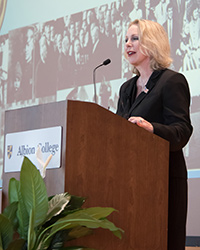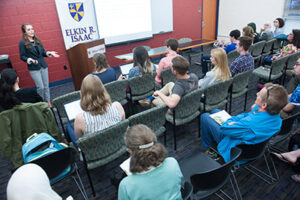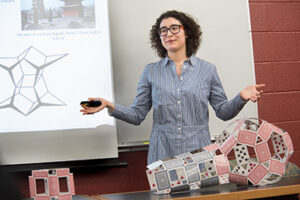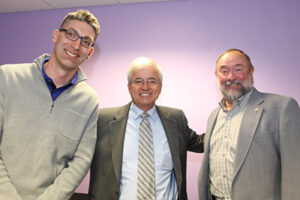A Granddaughter’s Portrait of a General and President Caps 28th Isaac Symposium
People to People International's Mary Jean Eisenhower delivers Calvaruso Keynote
April 24, 2017

Mary Jean Eisenhower delivers the 2017 Joseph S. Calvaruso Keynote Address.
By Jake Weber
An appreciative audience got a unique, behind-the-scenes look at history as presidential granddaughter Mary Jean Eisenhower presented the 2017 Joseph S. Calvaruso Keynote Address on April 20. The evening capped Albion’s 28th annual Elkin R. Isaac Student Research Symposium, which saw approximately 100 students present original work on topics ranging from equine aromatherapy to cancer cell death, and Great Lakes sailing songs to sustainability and climate change.
For more than 20 years, Mary Jean Eisenhower has worked with People to People International (PTPI), a peace-focused organization founded by Dwight D. Eisenhower in 1956, during his time as the United States’ 34th president. Now serving as the organization’s president and CEO, she noted that the idea for PTPI sprang from then-General Eisenhower’s role in liberating Nazi camps at the end of World War II.
“Granddad was anguished over the atrocities he saw in the death camps,” Eisenhower said. He felt that how governments create peace wasn’t effective. He believed that if left up to people, they’d find a way to live in peace.”
Eisenhower also credited the influence of her grandfather’s mother, who was ironically a pacifist due to family trauma suffered during the Civil War. Although President Eisenhower and his five brothers were raised in poverty, all were wealthy when they died, which Mary Jean attributed to their parents’ drive.

Biology major Julia Armitage, ’17, presents her research, titled “Vernal Pools Conservation and Its Effects on Amphibian Populations.”
Baptized in the Blue Room of the White House, Mary Jean spent much of her early life with her grandparents, in the White House and on the Eisenhower farm near Gettysburg, Pennsylvania, where President Eisenhower entertained many heads of state. She related childhood encounters with Winston Churchill and Charles De Gaulle, the latter of whom in particular enjoyed a warm relationship with Eisenhower for the remainder of his life.
She also recounted the far less cordial relationship Eisenhower had with Nikita Khrushchev. The Soviet leader brought gifts for the grandchildren, which they played with as Eisenhower and Khrushchev met. “Granddad came back into the room and grabbed all the gifts up,” Mary Jean recalls. “He shoved the gifts back at Khrushchev.”
Her memory of this incident arose again in 1996, when, as Eisenhower’s granddaughter, she attended a People to People conference, not knowing that Sergei Khrushchev would also be there. “I had been terrified of his father and wondered, ‘What in the world is this organization doing, making me share the podium with someone like him?’ I was beside myself,” Mary Jean recalled.

Chemistry and mathematics major Liliya Chernysheva, ’19, presents “Sheets, Tubes, and Capsules Constructed from Corner Connected Rectangles.”
As it turned out, however, “we spent the evening telling one corny joke after another. I walked away elated that I’d met one of the nicest people,” she said. “Then I realized—that’s what People to People is about. That’s when I decided I needed to devote myself to this.
“In essence, the son of my grandfather’s biggest adversary changed my life for the better. It’s quite an amazing moral.”
Eisenhower noted that her grandfather’s belief in People to People never wavered, even during the initial struggles to find private support. In the wake of the McCarthy era, several major foundations worried that PTPI might be a covert tool for psychological warfare. His persistence paid off, however, and early trustees included Walt Disney, Bob Hope, and Helen Keller.
Mary Jean expressed a quiet passion about her ability to extend her grandfather’s legacy as an architect for peace.
“People say you can’t create a lasting peace, not now. And I say ‘Well, you have to start somewhere,'” she said. “What I love about my job is that I get to see miracles, small and big, on a day-to-day basis. People are basically extremely good and the people in the news—don’t waste your time on them, because good people are all around you.”
Nick Whitney, '00, Gives Isaac Alumni Lecture

Surrounded by shark expertise: President Mauri Ditzler (center) with Isaac Alumni Lecturer Nick Whitney, ’00 (left), and biology professor emeritus Jeff Carrier.
The 2017 Symposium opened with the Elkin R. Isaac Alumni Lecture on April 19, presented by shark researcher Nick Whitney, ’00. Whitney’s use of data gathered by nonscientists and state-of-the-art positioning technology has provided groundbreaking information on the behavior of sharks from Hawaii to the New England coast.
Along with hair-raising tales of shark bites and near misses, Whitney encouraged the audience to remember a larger lesson behind his work.
“When you write for a peer-reviewed journal, it’s the job of the reviewers to tear your work apart,” he noted. “These are people who might be competing with me for grants. They’re not my buddies,” he said, noting that writers may spend up to a year answering the reviewers’ critiques—and even then, subpar research will never reach experts or the general public.
“We’re in an age right now where the truth and facts are under attack in our culture. Next time you hear on TV that climate change is a hoax, or evolution is a theory, or you shouldn’t vaccinate your kids, remember how much work the scientists have done to check their findings long before you hear about them,” Whitney urged.
“Try to disprove your own views. Don’t just look for things that support your preconceived biases,” Whitney said. “Try and be your own scientist.”